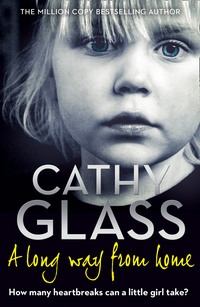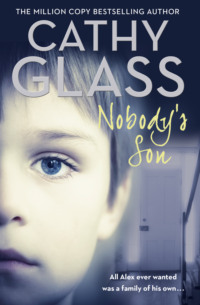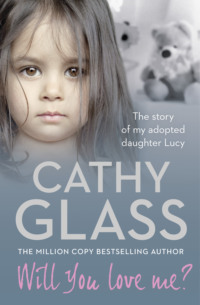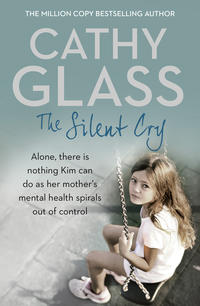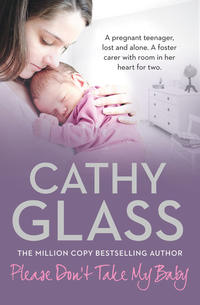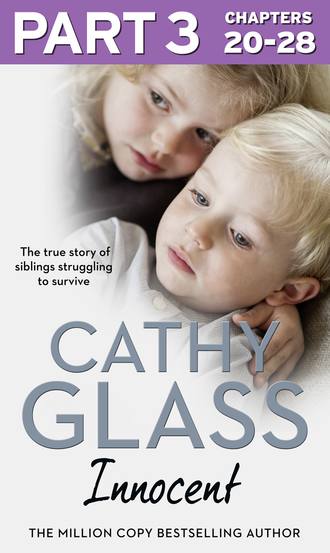
Полная версия
Innocent: Part 3 of 3: The True Story of Siblings Struggling to Survive

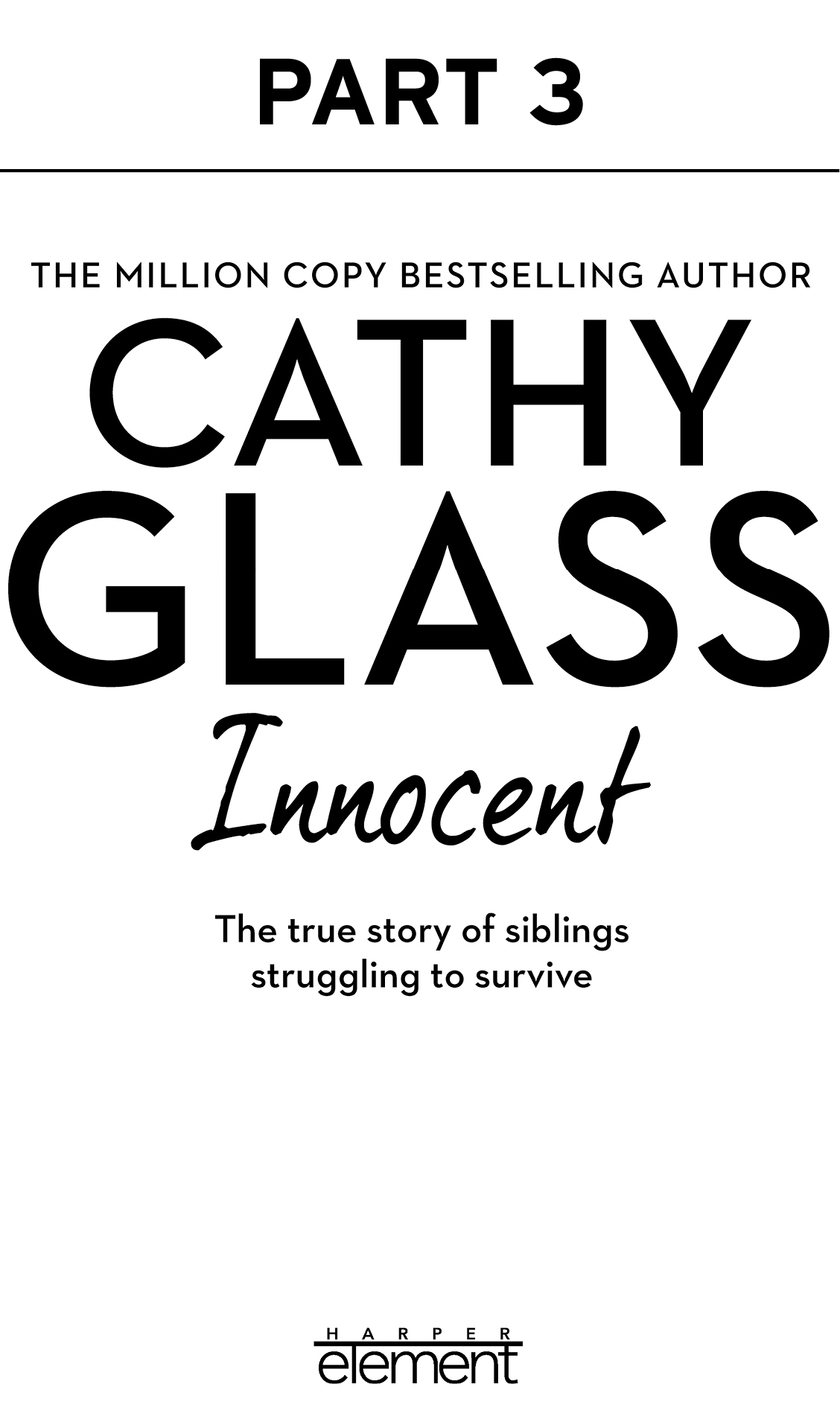
Copyright
Certain details in this story, including names, places and dates, have been changed to protect the family’s privacy.
HarperElement
An imprint of HarperCollinsPublishers
1 London Bridge Street
London SE1 9GF
www.harpercollins.co.uk
First published by HarperElement 2019
FIRST EDITION
Text © Cathy Glass 2019
Cover layout design © HarperCollinsPublishers Ltd 2019
Cover photograph © Voisin/Phanie/Getty Images (stock photo posed by models)
A catalogue record of this book is available from the British Library
Cathy Glass asserts the moral right to be identified as the author of this work
All rights reserved under International and Pan-American Copyright Conventions. By payment of the required fees, you have been granted the nonexclusive, non-transferable right to access and read the text of this e-book on screen. No part of this text may be reproduced, transmitted, downloaded, decompiled, reverse engineered, or stored in or introduced into any information storage retrieval system, in any form or by any means, whether electronic or mechanical, now known or hereinafter invented, without the express written permission of HarperCollins e-books.
Find out about HarperCollins and the environment at
www.harpercollins.co.uk/green
Source ISBN: 9780008341985
Ebook Edition © September 2019 ISBN: 9780008353735
Version: 2019-06-03
Contents
1 Cover
2 Title Page
3 Copyright
4 Contents
5 Chapter Twenty: Beyond Belief
6 Chapter Twenty-One: No Contact
7 Chapter Twenty-Two: Love the Children
8 Chapter Twenty-Three: Disclosure
9 Chapter Twenty-Four: The Wonder of Christmas
10 Chapter Twenty-Five: Aneta
11 Chapter Twenty-Six: Permanent?
12 Chapter Twenty-Seven: Judge’s Decision
13 Chapter Twenty-Eight: Saying Goodbye
14 Afterword
15 Suggested topics for reading-group discussion
16 Cathy Glass
17 If you loved this book …
18 Moving Memoirs eNewsletter
19 Praise for Cathy Glass
20 About the Publisher
LandmarksCoverFrontmatterBackmatter
List of Pagesvvi209210211212213214215216217218219220221222223224225226227228229230231232233234235236237238239240241242243244245246247248249250251252253254255256257258259260261262263264265266267268269270271272273274275276277278279280281282283284285286287288289290291292293294295296297298299300301302303304305307309
Chapter Twenty
Beyond Belief
It took a moment for what Tess had told me to sink in. ‘Aneta has been making her children sick?’ I said numbly. ‘But how? They’ve been ill here too.’
‘That’s one of the reasons we didn’t make the connection. When Filip came to see me, he brought in a bottle of fluid that we’ve now had tested. It contained linctus, which induces vomiting.’
‘What?’ I gasped again, in utter disbelief. ‘What sort of linctus?’ I’d never heard of anything like that.
‘It’s usually used for medicinal purposes to make someone sick if they’ve ingested a poison. It appears that Aneta was using it regularly to make her children sick. She was able to buy it on the Internet.’
‘But they were sick here too. How did it get into my home?’ I asked, struggling to understand.
‘It was in the drink Molly and Kit brought home from contact, including the pineapple juice we took from the Family Centre to be tested.’
‘Oh.’ My head spun.
‘The police have been informed and will be interviewing the parents later today.’
‘Both parents?’
‘Yes. Although, from what we know, it’s likely Aneta was solely responsible. But that’s for the police to decide. In the meantime I’m suspending contact from today. I’ve informed the parents and the Family Centre. Can you tell the children, please?’
‘Yes, but what shall I say?’
‘Blame it on me,’ Tess said decisively. ‘Say I have made the decision to suspend contact for now. I’ll leave the exact wording to you. But don’t tell them one or both of their parents has been making them sick.’
‘No, I won’t.’ I was still struggling to take it all in.
‘I’ll need to come and see them next week. I’m not sure which day yet. I’ll let you know. You haven’t got any other food or drink from contact still there? The police asked.’
‘No. I threw it all away when I thought it could be responsible for making the children ill. I was thinking it must have gone off, never in a million years …’ My voice trailed away. ‘So Aneta added this linctus to the juice?’ I asked, still unable to believe it.
‘Yes. I’ve given the food diary to the police. They may want to speak to you about it.’
‘They don’t think I had anything to do with making the children sick?’ I asked, horrified.
‘No, but they may need to clarify some of your entries. Your writing isn’t that clear in places and the diary may be used in evidence.’
‘Sorry, I scribbled down notes as I went, never thinking it would lead to this.’
‘Also, can you confirm that Molly and Kit haven’t been ill since food and drink was banned from contact.’
‘That’s right, they haven’t,’ I said. ‘But the rash and breathing difficulties that Kit developed – when I had to take him to hospital – how does that fit in?’
‘It’s likely to have been caused by repeated doses of the linctus she was giving them. It gradually poisons the system. It could have killed them both.’
I went cold as I remembered how I’d given Kit the juice drink the day he’d been very ill, lots of it. He’d wanted juice and, unaware it contained the poison, I’d given him as much as he wanted, unwittingly making him worse. My anger flared. Aneta had been using me as a tool to continue her evil actions, but why had she done it at all?
‘Why would anyone want to make their children ill?’ I asked. ‘I don’t understand.’
‘FDIA is a mental illness,’ Tess said. ‘The care-giver exaggerates the child’s illness or intentionally makes them sick in order to gain attention and sympathy. The victim is usually a child. FDIA is relatively rare but difficult to identify, so cases can easily be missed. It is most commonly found in parents of small children. One in ten victims dies as a result.’
I shuddered. ‘Good grief. It could have killed Molly and Kit.’ I felt weak at the knees. Then my thoughts turned to the miserable childhoods they’d endured – always being sick. ‘Those poor children,’ I said. ‘They’ve been ill for most of their lives and needn’t have been. I can’t believe this.’
‘I know. We’re struggling here too. Kit and Molly will be staying with you for now.’
‘You’ve decided that?’
‘Yes, I’ve spoken to my manager. In view of what’s come to light, the probability is that Aneta made up the allegations about you to deflect attention away from herself. The police are of the same opinion.’
‘That’s a relief. My family and I were very upset at the suggestion we could have intentionally harmed the children.’
‘Filip has apologized. He has asked that the children remain with you for now, as they are settled. I’ll notify Edith so she can inform the other carers.’
‘She’s due here soon,’ I said. ‘Shall I tell her?’
‘Yes, please. She can phone me if she has any questions. But I can only tell her what I’ve told you. I’ll know more once both parents have been interviewed by the police. Thank you, Cathy.’
‘For what?’
‘Keeping a very detailed food diary and making the connection.’
‘It was you who suggested the food diary,’ I pointed out. ‘I was logging everything, thinking I was going to be able to identify a food allergy. It would never have occurred to me it could be this.’
‘No. The doctors might have eventually made a connection, but by then it might have been too late. The social services became involved because of Kit’s broken arm and other suspected non-accidental injuries. None of us considered FDIA, although personally I thought there was more going on with Aneta than met the eye. But that was a hunch, no more. Thankfully, Filip brought in the bottle of linctus.’
‘How did he know what it was? Did he just find it?’
‘He told us that Aneta was always giving the children medicine, so he didn’t think anything of it. He worked long hours and left the childcare to Aneta. When he saw her adding the linctus to the juice to take to contact, he queried it. Aneta told him you weren’t giving the children their medicine and that was why they were sick, so she wanted to make sure they had it. Sometimes she gave them juice at contact – which I’m guessing is when they were sick soon after – and the rest was sent home to you. The contact supervisor didn’t notice the packets were already open. There was no reason for her to check. Filip has told us that Aneta kept the medicines in a locked cabinet in their bathroom and she had the key. He only became suspicious when you made the link between the children being sick and the food and drink they were having at contact. When we took the juice and biscuits from the Family Centre to be analysed, he confronted Aneta and demanded the key to the medicine cabinet, where he found the bottle of linctus. He said he was horrified when he read on the label that the medicine was used to induce vomiting.’
‘So you don’t think he was involved?’
‘It’s unlikely. He was very upset and remorseful when he came in, and is blaming himself for not spotting sooner that something was wrong. But that’s for the police investigation to determine. I’ll be in touch with a date to visit you and the children next week.’
‘All right. Thank you.’
Stunned from what I’d heard, I returned to the living room and, replacing the handset in its cradle, sat heavily on the sofa.
‘Look what we’ve made!’ Molly cried, proudly showing me a construction from building bricks.
‘Very nice.’
‘Kit helped.’
‘Good.’
Aneta had been intentionally making her children ill to gain attention and sympathy! It seemed incredible and beggared belief. I’d heard of the condition FDIA. Indeed, a few years back I’d read an article – a true-life story – that had featured a woman who as a child had been repeatedly made ill by her mother. It had gone undetected for eight years until she’d finally been able to tell a doctor what her mother was doing. The mother had received a prison sentence in a secure psychiatric hospital. I’d never personally come across a case of FDIA until now, and I hoped I never would again.
I remembered Tess telling me when she’d first placed Molly and Kit that Aneta had taken the children to the doctor and hospital dozens and dozens of times. It was horrendous to think what they had been through. All those unnecessary tests, some of which had been very uncomfortable, when the doctors had tried to establish the cause of their illness. It would be upsetting enough to have to put a child through all of that if it was necessary and they were genuinely ill, but it was monstrous if they were not and it was avoidable. Molly’s and Kit’s young lives had been blighted by sickness, and it was their mother’s fault!
As I watched the children playing, my heart sank at the thought that I had added to their suffering by giving them food and drink from contact, which contained the linctus to make them ill. I remembered Molly once saying that my juice was nicer than her mother’s. I hadn’t thought anything of it at the time, but now I wondered if the linctus had made the juice taste odd. Lucy hadn’t mentioned it when she’d had their juice and been sick, but I would ask her later when she came home. I had to admit it was clever of Aneta, adding the poison to the packets of juice and then sending them home. She would have known some of it was bound to be consumed on days when the children didn’t have contact, thus deflecting any suspicion away from her. Clever, crafty, cunning, devious and vicious, I thought. Had the children only ever been ill just after contact, I might have made the connection sooner. Although I might have put it down to the emotional upset of having to say goodbye to their parents, as I had done when Molly and Kit had first arrived. I remembered the night Molly had told me it was thinking of her mummy that had made her sick. I had assumed she meant she was upset and missed her, but now it had a different connotation – as if she’d associated being sick with her mother. The two had become synonymous.
All those times Aneta had protested her innocence and I’d almost believed her and wondered if the social services had got it wrong. Yet shouldn’t Filip have spotted something sooner, living in the same house? Maybe not, for, as Tess said, he worked long hours and left the childcare to Aneta.
I was suddenly jolted from my thoughts by a ring on the front doorbell. I glanced at the clock on the mantelpiece. It was nearly eleven o’clock. ‘That’ll be Edith,’ I said, standing. I left the children playing as I went to answer the door.
‘Hello,’ Edith said, business-like and sombre. ‘I’ll have to take a statement from you, but I’m aware the children are here. Can they play in another room?’
‘Statement?’ I asked, confused.
‘Yes, in respect of the allegations.’
‘Oh. That’s all changed. Tess has just phoned. The children can stay with me for now.’ I then told her what Tess had said, staying in the hall so that Molly and Kit wouldn’t hear.
Edith’s face went through a spectrum of emotions: doubt, shock, horror and back to doubt. ‘I’ll need to speak to Tess to confirm all of this,’ she said, and took her mobile phone from her jacket pocket.
‘I’ll leave you to it then.’ I returned down the hall to the living room.
I supposed it was reasonable that Edith would want to check what I’d told her, although the social services had been quick enough to believe Aneta when she’d made the allegations against me.
Molly and Kit were still playing nicely. ‘Edith is in the hall using her phone,’ I said. ‘You two stay here and I’ll make you a drink and a snack.’ They usually had one about now.
From the kitchen I could hear Edith on her phone. She’d got through to Tess and was mainly listening, interjecting with the occasional ‘Oh’, ‘I see’ and ‘Really?’
I cut up some cheese into little squares, halved some grapes, sliced a banana and arranged it in bowls for the children’s snack. I poured their drinks – Kit’s into his trainer cup and Molly’s into a plastic beaker – and then set them ready on the table. I called Kit and Molly in and made myself a cup of coffee.
Edith finished on the phone. ‘We’re in here!’ I called.
‘You were right,’ she said, coming into our kitchen-diner.
I looked pointedly in the direction of the children, reminding her not to let anything slip in front of them. ‘Do you want a coffee?’ I offered.
‘Yes, please.’
I made her a coffee and then, leaving Kit and Molly at the table eating their snacks, Edith and I went into the hall, where I could keep an eye on the children but they couldn’t easily hear us.
‘Tess confirmed that the allegations against you were unfounded,’ Edith said. ‘I don’t think I need to take a statement from you, but I’ll check with my manager when I get back to the office.’
I nodded. Whether Edith had to take a statement or not was the last thing on my mind. ‘Have you ever come across FDIA before?’ I asked, still reeling from the shock of it.
‘Yes. When I worked in child protection – before I became a supervising social worker – we had something similar. A mother made her child ill by crushing up her antidepressant tablets and putting them into the child’s food. The child nearly died.’
‘That’s awful,’ I said, horrified.
‘I believe there are about two hundred cases of FDIA or Munchausen syndrome by proxy a year in this country alone, as well as more cases of just Munchausen’s syndrome, when the person pretends they are ill or makes themselves ill. And that’s only the ones that are detected. You remember the case of Nurse Beverley Allitt? She was convicted of murdering infants in the hospital where she worked as a trainee nurse.’
‘Yes, it was horrendous,’ I said. Most people would remember the case. It had been widely reported in the news and had shocked the whole country.
‘She was diagnosed with suffering from Munchausen syndrome by proxy – or FDIA as it’s now called,’ Edith said.
I shuddered. Dear little Molly and Kit could have easily died.
‘Tess has suspended contact,’ I said. ‘She’s asked me to tell the children, but not the reason. She is going to see them next week. It’s difficult to know what to say to them, they’re so young.’
‘Do you want to do it while I’m here?’
‘Yes, we may as well.’
We returned to the kitchen-diner where Molly and Kit were finishing their snacks and drinks. ‘You are doing well,’ I said, sitting at the table and setting down my mug of coffee. Edith sat next to me, opposite the children. There was no easy way to tell them that they wouldn’t be seeing their parents. ‘Your social worker, Tess, telephoned,’ I began. ‘She’s decided it is best for now if we don’t go to the Family Centre.’
‘Why?’ Molly asked.
‘Because Tess needs to sort out some things to make sure you are safe. She has told your mummy and daddy, so they won’t be going to the Family Centre either.’ I didn’t expect Kit to understand, but clearly Molly would.
‘What things?’ she said.
Edith replied. ‘Sometimes social workers have to make difficult decisions. Your social worker has decided that it’s better for you and Kit if you don’t go to the Family Centre to see your parents for a while.’
‘When do we see them?’ Molly asked.
‘We’re not sure yet,’ Edith said.
‘Tess will tell us more next week,’ I added.
Molly seemed to accept this, although I knew she was bound to return to the matter later with more questions. I would answer them as best I could without telling her the real reason contact had been suspended. Having finished eating, Kit began agitating to be out of his chair so I undid his harness and helped him down. We all went into the living room where the children played, while Edith continued with the standard part of her supervisory visit, much as she usually did. She asked how the children were generally, if there’d been any changes in my household – a standard question at each visit – and made some notes. She advised me on further training, checked my log notes and then looked around the house. Before leaving, she set the date for her next supervisory visit but said she would be in touch after she’d spoken to her manager.
Once she’d gone, I felt in dire need of a change of scenery and told the children that as there was no contact we would go out. It was raining, so the park wasn’t an option.
‘Can we go to the ball pond?’ Molly asked.
‘Where we went yesterday?’ I said.
‘Yes.’
‘OK.’
She was delighted and went to find her shoes. Kit followed her. Going to the soft-play centre would help take their minds off not seeing their parents and we could have some lunch there too. While the children tried to put on their shoes, I sent a WhatsApp message to the Glass group: Molly and Kit staying for the foreseeable future. Will explain when I see you. Love Mum xxx.
Chapter Twenty-One
No Contact
‘So the witch tried to poison me!’ Lucy exclaimed, shocked.
‘It wasn’t intended for you,’ I said. ‘But yes, I’m certain drinking Molly and Kit’s juice is what made you sick.’
I was telling my family about Aneta making the children ill and FDIA as they came home, always making sure that Molly and Kit couldn’t hear. Paula had visibly paled when I’d told her. Now Lucy was upset and angry.
‘Evil or what! I might have died!’ Lucy cried dramatically.
‘I doubt it from one dose, but lots of the poison in small children could have killed them.’
‘It’s shocking. We covered Munchausen syndrome briefly in my nursery training, but I don’t think there’s ever been a case at the nursery, certainly not while I’ve been there.’
‘Lucy, did you notice if the juice tasted odd when you drank it?’ I asked.
‘Now you come to mention it, yes. I thought at the time it tasted a bit different – sharper – than the one you usually bought, but I put it down to it being a different brand. I still can’t believe what she’s been doing. We could have all been poisoned!’
‘Although in a way it’s probably just as well you did have some of that juice, as it helped me to make the connection.’
‘Glad I was of use,’ Lucy said tartly. ‘Well, at least Molly and Kit are safe and can stay with us.’
‘Yes, absolutely, for now at least.’
Lucy went off to play with them and I continued to make dinner. When Adrian came home – just before dinner – I quietly told him too, and of course he was as shaken as the rest of us.
‘All those times the little ones were ill and they needn’t have been,’ he said, greatly saddened. ‘Those poor children, and the worry it caused you.’
‘Caused all of us,’ I said. For to be honest, since Molly and Kit had arrived and been constantly sick, it had been one long worry for us all. Only once they’d stopped being ill had it become easier and we could enjoy looking after them, and then we’d had the worry of them being moved.
We ate together and then Adrian went to see Kirsty, saying he’d be back late as he didn’t have to be up for work in the morning and I shouldn’t wait up for him. Once Molly and Kit were in bed, I telephoned my mother. I told her that Molly and Kit were no longer being sick, as the cause had been identified.
‘That’s good,’ she said. ‘I thought the doctors would eventually find out what they were allergic to.’
I left it like that and didn’t explain further. Mum didn’t need to know about FDIA and the horror of a mother intentionally making her children ill – not at her age. It would upset her and play on her mind. Bad enough to know that a parent had repeatedly lashed out and hit a child in anger, or neglected them through drug or alcohol abuse, as had happened to many of the children I’d fostered. But how much worse to learn that a mother had systematically made her children ill over months, if not years? I had to remind myself that it was a mental illness and I shouldn’t judge Aneta.
I was still puzzled by the linctus Tess had referred to, which Aneta had bought online to induce vomiting. I’d never heard of such a thing, and with Molly and Kit asleep, Adrian out, Lucy getting ready to go out with her friends and Paula relaxing in her bedroom, I went into the front room and sat at my computer. I typed how to induce vomiting into a search engine and a list of websites appeared. I found what I was looking for very quickly. It wasn’t called linctus but syrup, and yes, it could be bought easily online. Its original purpose, I read, was for the emergency treatment of certain kinds of poisoning by making the patient vomit. It came with the warning that it should not be used to cause weight loss, and if used regularly it could lead to serious health problems, including rashes, breathing difficulties, seizures and even death. I failed to understand why such an item would be available for the public to buy at all, but then of course you can buy virtually anything on the Internet now. There was a picture of a bottle of the syrup, just like the one Aneta would have bought to make her children sick. I reminded myself again that FDIA was a mental illness and I shouldn’t demonize Aneta.


